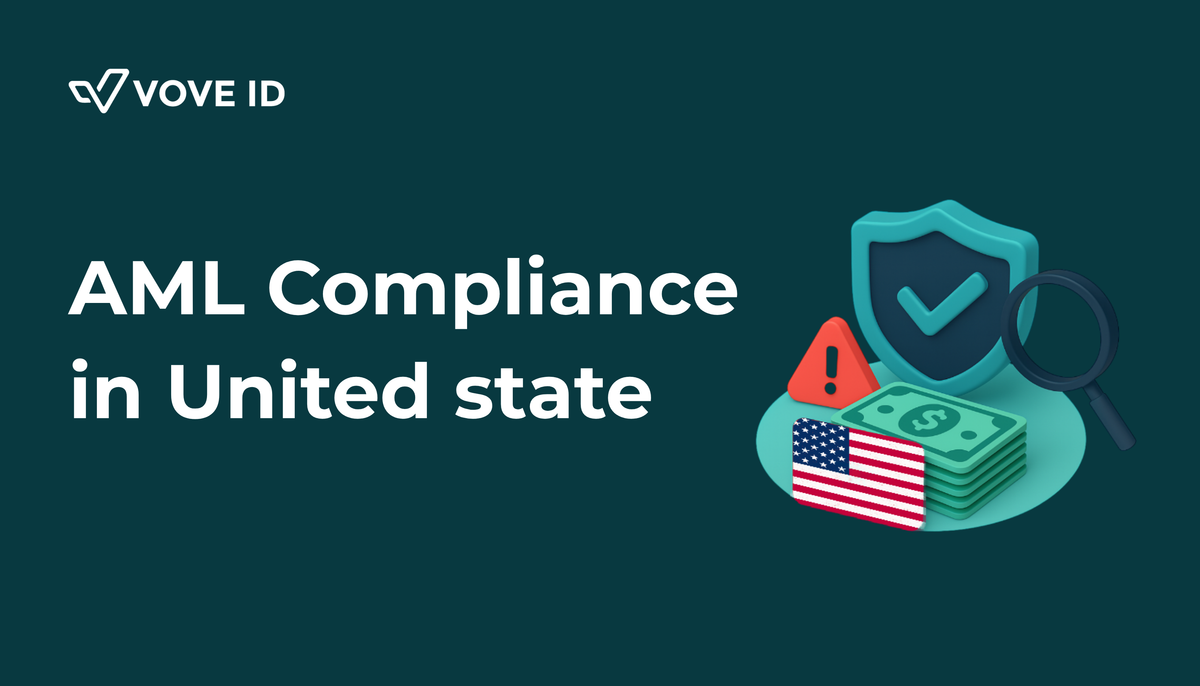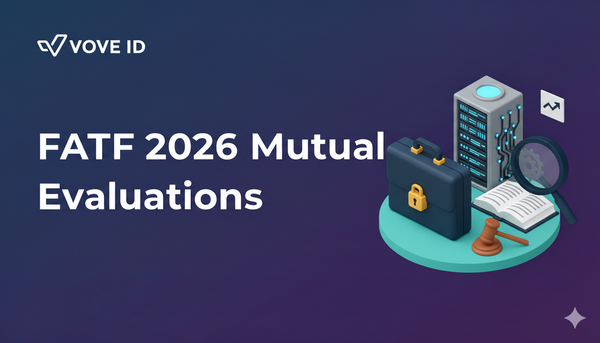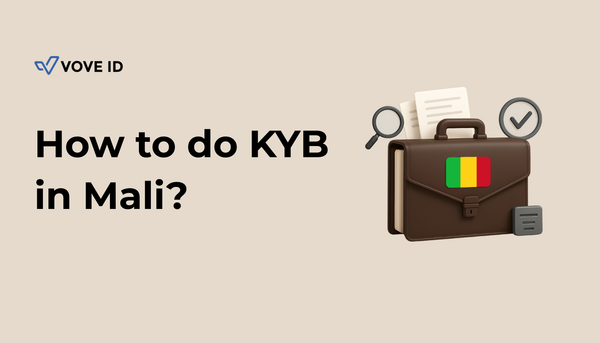AML Compliance in the USA: A 2025 Guide for Fintechs and Regulated Businesses
Discover the 2025 U.S. AML compliance landscape, from BSA to CTA. Learn how fintechs can meet FinCEN requirements and use technology to stay ahead.

Introduction
The United States operates one of the most advanced and closely monitored anti-money laundering systems in the world. In 2024, U.S. regulators imposed more than 5 billion USD in AML-related fines, targeting both global banks and emerging fintechs. This reflects the country’s zero-tolerance stance toward financial crime.
For fintech companies, digital wallets, trading platforms, and other regulated businesses entering or operating in the U.S. market, understanding the AML framework is not just a legal requirement, it is a business survival strategy. In this guide, we break down the core laws, agencies, sector-specific risks, and 2025 updates, while showing how modern tools like VOVE ID help companies stay compliant without slowing down growth.
Regulatory Landscape
The U.S. AML framework is built on decades of legislation and is enforced by multiple agencies with overlapping powers. The foundation is the Bank Secrecy Act (BSA) of 1970, which established recordkeeping, reporting, and AML program obligations. It was later strengthened by the USA PATRIOT Act in 2001, which introduced enhanced due diligence for foreign accounts and more rigorous monitoring of cross-border transactions.
The Anti-Money Laundering Act of 2020 (AMLA 2020) modernized compliance expectations, expanded FinCEN’s authority, and introduced stronger whistleblower protections. The Corporate Transparency Act (CTA), effective from January 2024, requires many U.S. and foreign entities to submit beneficial ownership details to FinCEN.
Key regulatory bodies include FinCEN (overseeing AML policy and enforcement), OFAC (managing sanctions), and sector-specific regulators like the OCC, FDIC, Federal Reserve, SEC, CFTC, and FINRA.
2025 AML Regulatory Updates
This year brought important changes for businesses:
- FinCEN expanded its beneficial ownership database access for certain financial institutions, enabling more accurate Customer Due Diligence.
- OFAC updated its sanctions screening guidance, emphasizing real-time transaction monitoring.
- Increased scrutiny on crypto exchanges and decentralized finance (DeFi) platforms under the BSA framework.
- Clarifications on AML program expectations for non-bank financial institutions, including payment processors and fintech lenders.
These changes highlight the importance of having a compliance process that adapts quickly. VOVE ID’s verification and monitoring tools are designed to integrate regulatory updates without disrupting onboarding flows.
Key AML Laws and Regulations in the U.S.
Key U.S. AML Laws and Their Impact
| Law / Regulation | Year Enacted | Main Focus |
|---|---|---|
| Bank Secrecy Act (BSA) | 1970 | Recordkeeping, Suspicious Activity Reports, AML program requirements |
| USA PATRIOT Act | 2001 | Expanded due diligence and cross-border transaction monitoring |
| Anti-Money Laundering Act (AMLA) | 2020 | Modernized AML rules, enhanced FinCEN powers |
| Corporate Transparency Act (CTA) | 2021, enforced from 2024 | Beneficial ownership reporting |
| FinCEN CDD Rule | 2018 | Standardized Customer Due Diligence for legal entities |
Core AML Compliance Obligations
Under U.S. law, regulated businesses must:
- Maintain a written AML program tailored to their operations and risk profile
- Conduct Customer Due Diligence (CDD) and, where applicable, Enhanced Due Diligence (EDD)
- Identify and verify beneficial owners under the CTA
- Monitor transactions continuously to detect unusual activity
- File Suspicious Activity Reports (SARs) and Currency Transaction Reports (CTRs) as required
- Screen against OFAC’s sanctions lists before and during the business relationship
- Train employees regularly and maintain audit-ready documentation
Sector-Specific Challenges
For fintechs and startups, compliance can be both a technical and operational challenge.
- Digital wallets process high volumes of microtransactions, making anomaly detection difficult without automated systems.
- Crypto exchanges must implement blockchain analytics alongside standard CDD, while also complying with state-level money transmitter rules.
- iGaming and online trading platforms face a patchwork of state and federal requirements, complicating compliance strategy.
VOVE ID addresses these challenges with a flexible identity verification platform that supports multi-country onboarding, advanced biometrics, sanctions screening, and real-time risk scoring. This means fintechs can meet both U.S. and cross-border compliance standards from a single API.
The Role of Technology in U.S. AML Compliance
The scale of financial transactions in the U.S. makes manual compliance processes impractical. Automated solutions now handle tasks like ID verification, sanctions list screening, transaction monitoring, and beneficial ownership checks.
AI-driven platforms reduce false positives, speeding up onboarding while ensuring thorough risk assessment. VOVE ID’s solution integrates seamlessly with fintech platforms, enabling:
- Instant identity verification using biometric and document checks
- API-based onboarding for new customers and businesses
- Real-time sanctions and watchlist screening
- Automated reporting to support SAR filing and compliance audits
By embedding these processes at the onboarding stage, businesses can prevent high-risk accounts from entering the system in the first place.
Did You Know?
The 2020 FinCEN Files leak exposed suspicious transactions worth more than 2 trillion USD moving through major banks, including some in the U.S. While not all were illegal, the revelations highlighted the limitations of traditional monitoring systems and pushed regulators to demand more proactive measures from financial institutions.
Another interesting fact: In the first half of 2024, FinCEN reported a 14 percent rise in SAR filings linked to cryptocurrency transactions, signaling increased regulatory attention to the sector.
Practical Steps for Fintechs Entering the U.S. Market
To succeed in the U.S., startups and scale-ups should:
- Assess their regulatory classification early to know if they are considered a Money Services Business (MSB)
- Build AML program requirements into product design rather than treating them as afterthoughts
- Use identity verification providers like VOVE ID that can adapt to multiple jurisdictions
- Implement real-time monitoring to flag and stop suspicious activity before it escalates
- Keep clear, auditable compliance records for at least five years
These practices not only reduce legal risk but also improve investor confidence and operational resilience.
Conclusion
AML compliance in the U.S. is demanding, but it also builds trust and credibility in the market. By understanding the regulatory framework, staying informed on annual updates, and leveraging technology to automate key processes, businesses can stay on the right side of the law while maintaining a frictionless customer experience.
VOVE ID provides fintechs and other regulated businesses with the tools to meet U.S. AML standards, from onboarding verification to ongoing monitoring, in a way that scales with growth. In a country where compliance missteps can cost millions, having the right partner is not just beneficial, it is essential.
Stay compliant with VOVE ID.
Automate identity verification and simplify AML compliance today.




